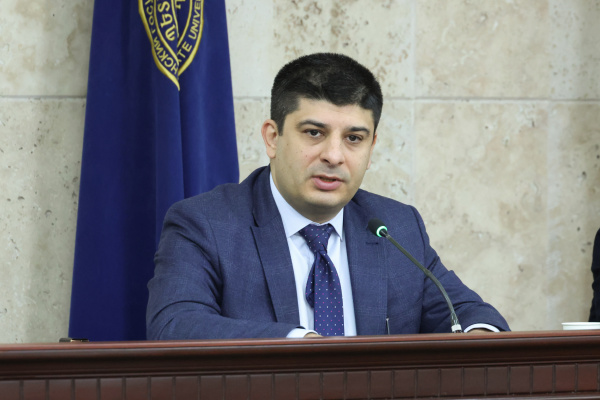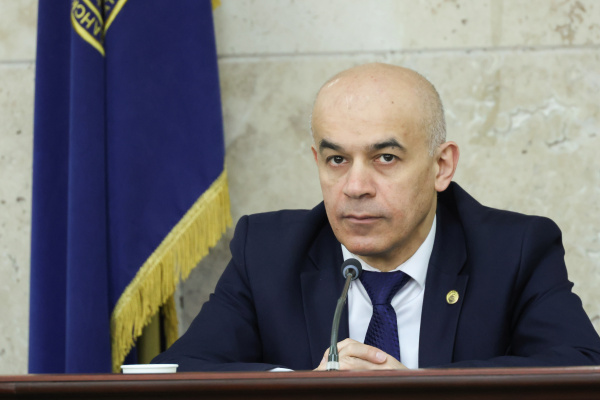April 17, 2025 | 15:15
Conferences
Research centers and institutes
Research
Institute for Armenian Studies summarizes its scientific activities of the past year
The review conference of the Institute for Armenian Studies (IAS) was held at Yerevan State University, where the institute's structural subdivisions presented their scientific activities over the past year.

Rafayel Barkhudaryan, Vice-Rector for Scientific Affairs at YSU, emphasized the importance of the conference organized by IAS, highlighting: "For the second consecutive year, the Institute of Armenian Studies has successfully organized its annual review conference. This is significant not only because it enhances communication within the institute’s departments but also because it allows partners to be informed about each other's work, research, and projects. This approach fosters interdisciplinary collaboration."

He also reflected on YSU's achievements over the past year, particularly noting the unprecedented number of scientific publications by university researchers in journals indexed in the international databases Scopus and Web of Science. Rafayel Barkhudaryan underlined the high quality and relevance of the research, which will likely attract significant interest from the international scientific community. He pointed out that the volume of publications by YSU researchers surpasses the output of other research institutions in Armenia.
"Within the scientific and educational field, we must be able to raise the bar and strive to meet it," the vice-rector concluded.

The Director of IAS, Vahram Petrosyan, introduced the participants of the conference, noting that more than 20 reports were prepared on current geopolitical, economic, social, and historical issues.
Armenian-Turkish Relations
Junior researcher Ara Hovhannisyan, Associate Professor at the Diaspora Studies Department, discussed the current process of Armenian-Turkish relations and the stance of the Armenian diaspora on the matter. He emphasized that the issue of Armenian-Turkish relations has been particularly sensitive in the diaspora, as any development is closely tied to issues of pan-Armenian significance, such as the recognition of the Armenian Genocide.
"Since 1991, no steps have led to results in the Armenian-Turkish normalization process. Despite Turkey's repeated declarations of willingness to establish and normalize relations, no concrete actions have been taken to implement them. Moreover, attempts at normalization have ended unsuccessfully, as Turkey has consistently raised unacceptable preconditions for Armenia," he stated, also noting that a new phase in the process began after the 44-day war in 2020.
Considering the meetings between representatives of Armenia and Turkey after the 44-day war, as well as the deep concerns of the Diaspora regarding this process, the researcher noted: "Since the process of normalizing relations is taking place in a very complex geopolitical context for both the Armenian people and Armenia (as Armenia found itself in a vulnerable situation following the heavy losses of the 2020 war), there is an opinion within the diaspora that Armenia is unable to protect its interests and, instead of initiating a process without preconditions, will simply make harmful concessions for the Armenian people during the negotiations."
Ara Hovhannisyan also addressed the publications in Armenian newspapers in Turkey following the 2022 meeting between representatives of the Republic of Armenia and Turkey, as well as the concerns of Armenian political organizations within the Diaspora.
Diaspora Movements
Researcher Tigran Ghanalanyan from the Diaspora Studies Department presented the causes and trends of Armenian emigration from Northeast Africa during the 1950s-1980s, specifically from Egypt, Ethiopia, and Sudan. He highlighted that Armenians from these countries migrated more to third countries than returned to Armenia, pointing out significant emigration from Egypt to Canada and Australia. Tigran Ghanalanyan noted that as a result of emigration, Armenian communities in Ethiopia and Sudan were no longer sustained, and the Armenian population in Egypt drastically declined from 35,000-40,000 to only 3,000.
Reports were also presented by other researchers from various IAS departments, including Gohar Ghambaryan, Sara Mkrtchyan, Sargis Grigoryan, Narek Sukiasyan, Mushegh Ghahriyan, Narek Grigoryan, Rafik Avetisyan, Liana Hambardzumyan, Nelli Minasyan, and others. They addressed topics such as Armenia and China’s regional economic policies, food security challenges in Armenia, Ottoman Empire’s state policies and the dispossession of Armenians, repatriation and integration policies, hybrid warfare in the context of Armenia and Israel, and the EU's evolving foreign and security policies in the South Caucasus, among others.











